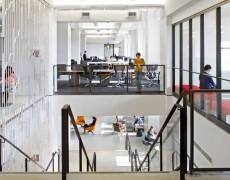May 7, 2014
The business of workplace design and management; new issue of Insight is now available
 In the latest Insight newsletter, available to view online; Mark Eltringham lists just seven of the ways in which flexible working may have actually made our lives more rigid; expectations for rising rents as demand for commercial property reaches the highest level since before the financial crisis; ‘Walkie Talkie’ skyscraper signs up two new tenants; and the BCO names London and the South East’s best recently refurbished examples of workplace design. The idea that staff find greater job satisfaction when they work in environmentally friendly surroundings is challenged by a new study; while another report claims that wearable technology could be a boast to productivity; and the CIPD warns that rigid organisational hierarchies hamper the development of management and leadership skills within the workplace. To automatically receive our weekly newsletter, simply add your email address to the box on the home page.
In the latest Insight newsletter, available to view online; Mark Eltringham lists just seven of the ways in which flexible working may have actually made our lives more rigid; expectations for rising rents as demand for commercial property reaches the highest level since before the financial crisis; ‘Walkie Talkie’ skyscraper signs up two new tenants; and the BCO names London and the South East’s best recently refurbished examples of workplace design. The idea that staff find greater job satisfaction when they work in environmentally friendly surroundings is challenged by a new study; while another report claims that wearable technology could be a boast to productivity; and the CIPD warns that rigid organisational hierarchies hamper the development of management and leadership skills within the workplace. To automatically receive our weekly newsletter, simply add your email address to the box on the home page.


























May 9, 2014
Flexible working benefits are undermined by short sighted employers
by Pam Loch • Comment, Flexible working, Legal news, Workplace
There has been a growing perception that flexible working practices are now commonplace in the workplace. However a recent report from Working Families, a charity set up to help working parents and carers find a balance between their responsibilities at work and at home, suggests this is a myth. Their report reflects growing concerns based on experiences and queries from their helpline that employers are in fact, becoming more rigid. The report suggests that working parents are coming under increasing pressure to give up their flexible working arrangements. It highlights “a growing number of callers to the helpline reporting the family-friendly working pattern they have had in place for years being changed or withdrawn virtually overnight, with no opportunity for them to express their views”. Ironically, despite the Government’s championing of flexible working it seems the imposition of employment tribunal claim fees could be behind the backlash. (more…)